Early detection of liver cancer
A simple blood test makes it possible now

A dissemination seminar on “Early Detection of Liver Cancer Patient through Simple Blood Test” was held today at Holiday Inn Dhaka. The dissemination seminar is based on the article published in the high-impact peer-reviewed international journal Nature Communications.
The test identifies liver cancer through distinctive DNA methylation signatures and has the potential to revolutionize liver cancer detection in high-risk populations (that includes people with liver diseases, type 2 diabetes and alcoholics), thereby decreasing morbidity and mortality rates associated with this cancer.
HKG Epitherapeutics Ltd., the International Centre for Diarrhoeal Disease Research, Bangladesh (icddr,b), Bangabandhu Sheikh Mujib Medical University, and a team of eminent Bangladeshi clinicians and scientists conducted the research work.
Professor Moshe Szyf, the Chairman of HKG Epitherapeutics Ltd., and a fellow of the Royal Society of Canada presented the keynote, Professor DrMamun Al Mahtab, Hepatologist, BSMMU discussed on Bangladesh and Global scenario regarding Hepatitis and liver cancer, and icddr,b scientist DrWasif Ali Khan discussed the protocol title.
Professor DrSharfuddin Ahmed, Vice-chancellor, BSMMU graced the event as the chief guest. Additionally, DrRafique-us-Saleheen, Programme Manager-1, Non-communicable Disease Control Program, DGHS, and DrAfsanaAlamgir Khan, Assistant Director (Project Coordination), DGHS were present as special guests and icddr,b’s Executive Director DrTahmeed Ahmed chaired the event.
Liver Cancer, a prevalent global cancer, is often detected at advanced stages, leading to treatment challenges and reduced survival rates. The developed assay uses sophisticated sequencing and multiplexing techniques to differentiate liver cancer samples from normal tissues, other blood samples, and non-liver cancer tumours, overcoming the limitations of traditional diagnostic methods.
The research group evaluated the assay on 554 clinical study participants, comprising liver cancer patients, non-liver cancer patients, individuals with chronic hepatitis B, and healthy controls. The results revealed a liver cancer detection sensitivity of 84.5% at 95% specificity, demonstrating its promising potential for early liver cancer detection (registered in ClinicalTrials.gov as NCT03483922, a registry of clinical trials run by the United States National Library of Medicine at the National Institutes of Health).
Professor DrSharfuddin Ahmed, Vice-chancellor, BSMMU said, “Today's dissemination seminar marks a remarkable stride in the field of healthcare, with the potential to transform liver cancer detection. As we unite to combat liver cancer, this innovative assay, rooted in distinctive DNA methylation signatures, holds the promise to positively impact high-risk populations, reducing the burden of this prevalent cancer.”
Professor Moshe Szyf, stated “Our developed high-throughput assay represents an innovative step forward in cancer detection. It contributes significantly to the early detection of HCC, with the potential to transform cancer diagnostics and patient outcomes.”
Professor Dr. Mamun Al Mahtab, Head of the Interventional Hepatology Division, BSMMU, who led this research from BSMMU, stated that “While further study is required, this development represents a substantial stride towards a standard early detection tool for individuals at high risk of liver cancer, with the ability to considerably reduce the disease's impact on people at risk of developing liver cancer”.
Dr. Wasif Ali Khan, a Scientist at the icddr,b and Principal Investigator of the research who led and coordinated the project, remarked “This breakthrough development is a critical milestone in liver cancer detection, with tremendous potential to save lives and improve healthcare in Bangladesh. Our unwavering commitment to advancing cancer diagnostics is reflected in this remarkable achievement, aimed at enhancing the well-being of our population. The test will significantly reduce the burden of liver cancer and create a healthier future for all.”




